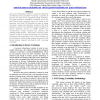Free Online Productivity Tools
i2Speak
i2Symbol
i2OCR
iTex2Img
iWeb2Print
iWeb2Shot
i2Type
iPdf2Split
iPdf2Merge
i2Bopomofo
i2Arabic
i2Style
i2Image
i2PDF
iLatex2Rtf
Sci2ools
HPCA
2007
IEEE
2007
IEEE
Implications of Device Timing Variability on Full Chip Timing
As process technologies continue to scale, the magnitude of within-die device parameter variations is expected to increase and may lead to significant timing variability. This paper presents a quantitative evaluation of how low level device timing variations impact the timing at the functional block level. We evaluate two types of timing variations: random and systematic variations. The study introduces random and systematic timing variations to several functional blocks in Intel? CoreTM Duo microprocessor design database and measures the resulting timing margins. The primary conclusion of this research is that as a result of combining two probability distributions (the distribution of the random variation and the distribution of path timing margins) functional block timing margins degrade non-linearly with increasing variability.
Block Timing Margins | Computer Architecture | Device Timing Variations | HPCA 2007 | Systematic Timing Variations |
Related Content
| Added | 01 Dec 2009 |
| Updated | 01 Dec 2009 |
| Type | Conference |
| Year | 2007 |
| Where | HPCA |
| Authors | Murali Annavaram, Ed Grochowski, Paul Reed |
Comments (0)

